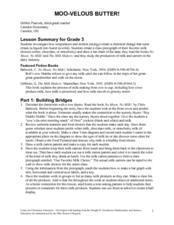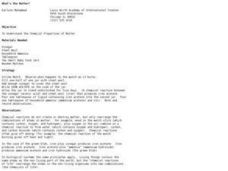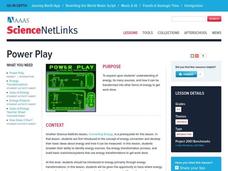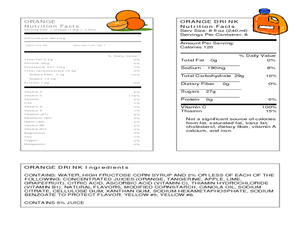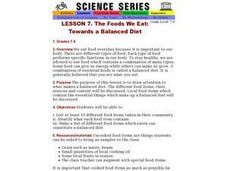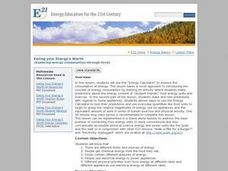Curated OER
Moo-Velous Butter!
Third graders investigate how temperature and motion (energy) create a chemical change that turns cream ( a liquid) into butter (a solid). They create a class pictograph of their favorite mils choices (white, chocolate, or strawberry)...
Curated OER
What's the Matter? (Living and Non-Living Things)
Understand how chemical reactions recombine atoms to create the "chemicals of life". An experiment, showing the basic chemical reactions of an iron nail or a match, helps young children start their understanding of permanent changes.
Curated OER
Power Play
Once your physical science stars have a grasp of the different forms of energy, use this resource to get them putting the energy to work. Small groups choose from seven different project options and work together to build an energy...
Virginia Department of Education
Go with the Flow
How does nature's hierarchy relate to our local human environment? Answer this question, along with others, as the class visually depicts the natural hierarchy provided by nature. Pupils discuss each piece of the pyramid and its energy...
Chicago Botanic Garden
Food for Thought: Climate Change and Trophic Cascades
Learners examines the arctic food web with a short video about polar bears and an article about bears and warming temperatures. They design an arctic food web and discuss the trophic cascade that could come from climate change.
Curated OER
Forms of Energy
Fifth graders brainstorm what forms of energy are used in an energy bike listing them on the board with the description placed beside each form for reference. They work in pairs to diagram the energy transformations that occurred while...
Curated OER
Food Chains, Food Webs, Biomass Pyramids and Cycle
In this food chains worksheet, students complete a crossword puzzle by placing 16 terms into the puzzle that match the clues given. Students review food webs, biomass pyramids, and the water cycle.
University of Georgia
Endothermic and Exothermic Reactions
Equip your chemistry class with the tools to properly understand endothermic and exothermic reactions. Young chemists collect, analyze, and graph data to determine how the Law of Conservation of Matter is applied to chemical composition...
Curated OER
Healthy Food is Good Food!
Students examine the difference between whole foods and junk foods. For this food lesson, students learn the definitions of whole food and junk food. They find the difference in tastes and textures of different foods by performing taste...
Curated OER
9th Grade
Ninth graders discuss the principal source of energy entering the marine ecosystem. They name some of the autotrophs at the Maui Ocean Center. Students name some of the heterotrophs at Maui Ocean Center. They are taught that plants are...
Teach Engineering
Hydrogen-Oxygen Reaction Lab
High schoolers conduct an experiment using the reaction of hydrogen and oxygen. After pairs balance the chemical equation for making water, they mix different ratios of hydrogen and oxygen in a chemical reaction. Classmates...
NOAA
Seafood and Human Health
Whether your young biologists realize it or not, humans play a significant role in marine ecosystems. To help them understand this fact children first create graphical representations that show homo sapiens' place in marine food chains,...
Curated OER
Ice Energy
Students explore how chemicals change water. In this chemical change lesson, students participate in an experiment to observe how salt effects ice and how ice cream freezes.
Curated OER
Ice Energy
Students learn how science affects foods. In this chemical reactions lesson, students make two kinds of ice cream. They evaluate the different changes based on the ingredients.
Curated OER
The Foods We Eat: Towards a Balanced Diet
Young scholars list at least 10 different food items grown/produced in their community, identify what each food item contains and make a list of different food items which constitute a balanced diet. They bring in food samples and write...
Curated OER
Biomass: The Energy of the Future
Sixth graders examine information about a variety of renewable fuels. They read key vocabulary terms, read and discuss a story handout, and conduct research on renewable fuels. Students then complete a comparison chart, and write an...
NOAA
Ocean Zones
How can organisms light up in water? Bioluminescence is light produced in a chemical reaction that can occur in an organism's body. First, learners determine what happens to light/color as you move into the deep ocean. In groups, they...
Curated OER
Walk a Mile for a Burger?
Students are introduced to the pedometer, and use this tool to associate physical activity (physical energy) with calories burned (chemical energy). They comprehend the making and burning of energy.
Curated OER
Eating your Energy's Worth
Students calculate the amount of electrical energy used in a week in food units. They create ways to reduce energy use. Students discuss the different forms and sources of energy. They discuss how people use electrical energy to power...
NASA
The Cycle of Matter
An educational activity focuses on the idea of conservation of matter through a demonstration of the water cycle, a discussion of digesting food, and the path of carbon and oxygen atoms as they change form.
Curated OER
Field Trip to the Watsonville Wetlands
Students explore the differences between food webs and food chains. In this wetland lesson plan students play a food web game and go on a scavenger hunt.
Curated OER
Animals and Plants of BC's Rocky Shore: lesson 3
Students create a mural of the food chain of the animals and plants of BC's rocky shore. In this food chain lesson plan, students also play a food chain matching game.
Curated OER
Biomass: The Energy of the Future
Students research renewable fuels. In this alternative energy lesson, students compile information and create a comparison chart on renewable resources. This lesson includes additional suggested readings, vocabulary, and a Biomass...
American Chemical Society
Changing the Density of a Liquid - Heating and Cooling
During a unit on density, pupils ponder whether or not temperature affects this property. By carefully inserting blue cold water and yellow hot water into a room-temperature sample, they will see the answer. Make sure to have done the...


